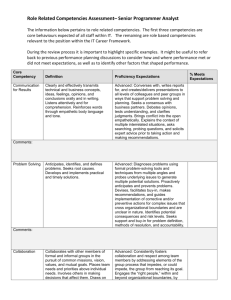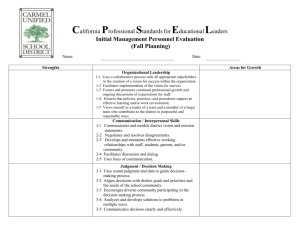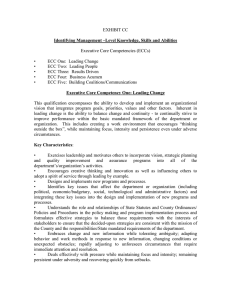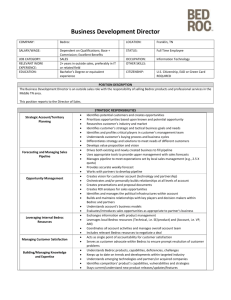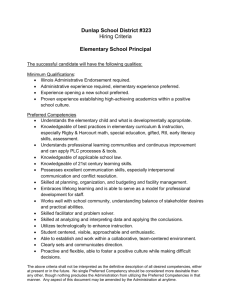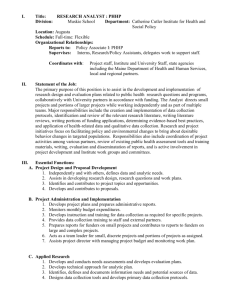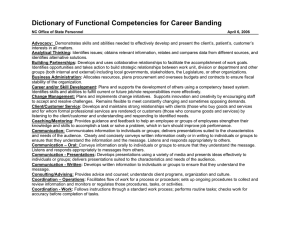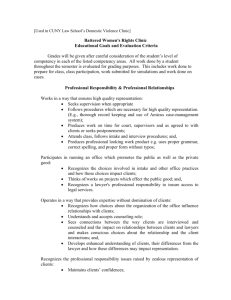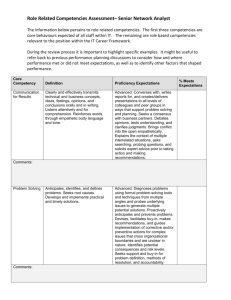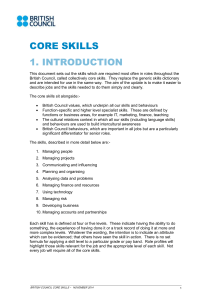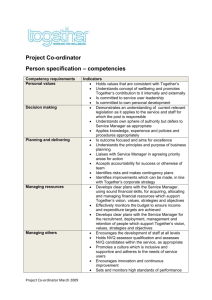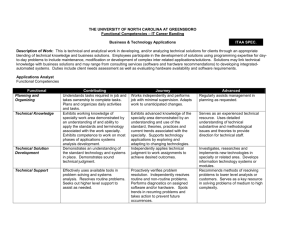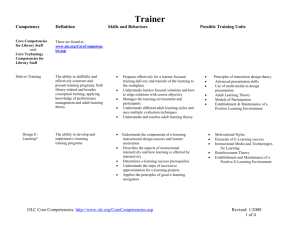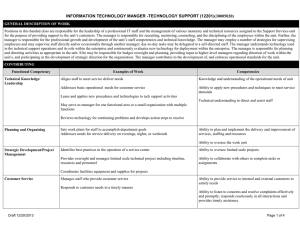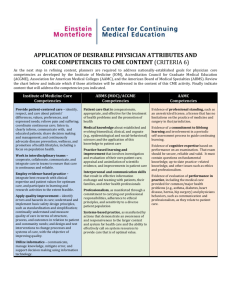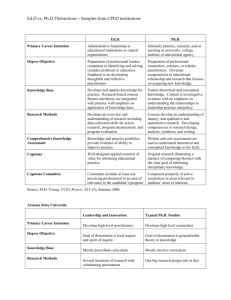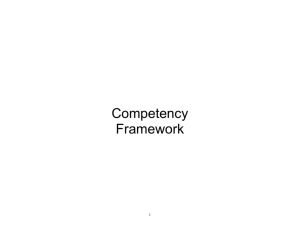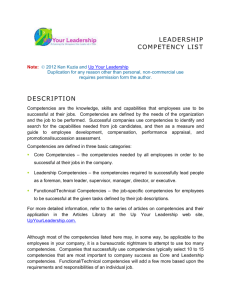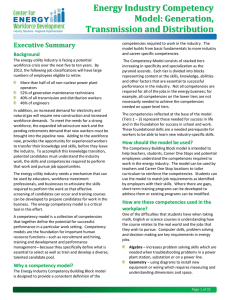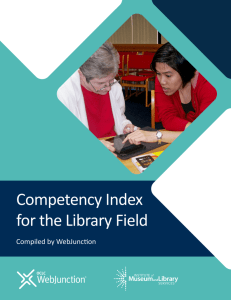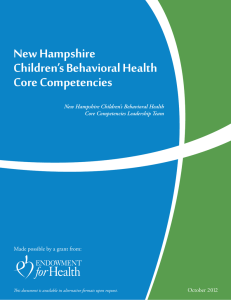behavioral competency definitions
advertisement
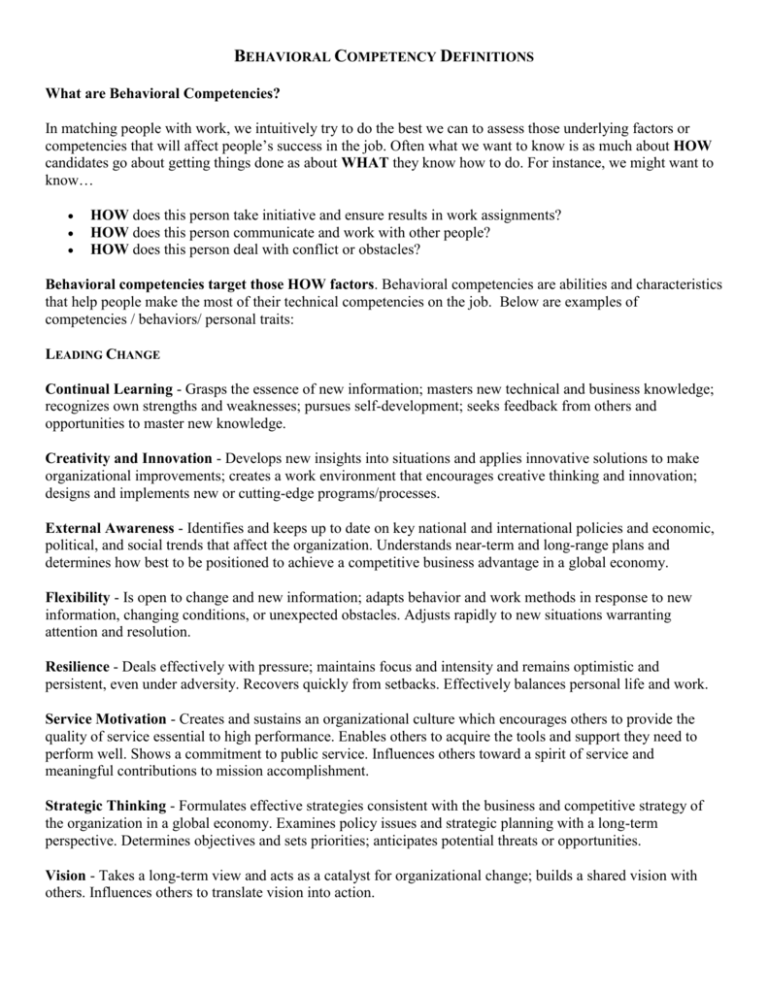
BEHAVIORAL COMPETENCY DEFINITIONS What are Behavioral Competencies? In matching people with work, we intuitively try to do the best we can to assess those underlying factors or competencies that will affect people’s success in the job. Often what we want to know is as much about HOW candidates go about getting things done as about WHAT they know how to do. For instance, we might want to know… HOW does this person take initiative and ensure results in work assignments? HOW does this person communicate and work with other people? HOW does this person deal with conflict or obstacles? Behavioral competencies target those HOW factors. Behavioral competencies are abilities and characteristics that help people make the most of their technical competencies on the job. Below are examples of competencies / behaviors/ personal traits: LEADING CHANGE Continual Learning - Grasps the essence of new information; masters new technical and business knowledge; recognizes own strengths and weaknesses; pursues self-development; seeks feedback from others and opportunities to master new knowledge. Creativity and Innovation - Develops new insights into situations and applies innovative solutions to make organizational improvements; creates a work environment that encourages creative thinking and innovation; designs and implements new or cutting-edge programs/processes. External Awareness - Identifies and keeps up to date on key national and international policies and economic, political, and social trends that affect the organization. Understands near-term and long-range plans and determines how best to be positioned to achieve a competitive business advantage in a global economy. Flexibility - Is open to change and new information; adapts behavior and work methods in response to new information, changing conditions, or unexpected obstacles. Adjusts rapidly to new situations warranting attention and resolution. Resilience - Deals effectively with pressure; maintains focus and intensity and remains optimistic and persistent, even under adversity. Recovers quickly from setbacks. Effectively balances personal life and work. Service Motivation - Creates and sustains an organizational culture which encourages others to provide the quality of service essential to high performance. Enables others to acquire the tools and support they need to perform well. Shows a commitment to public service. Influences others toward a spirit of service and meaningful contributions to mission accomplishment. Strategic Thinking - Formulates effective strategies consistent with the business and competitive strategy of the organization in a global economy. Examines policy issues and strategic planning with a long-term perspective. Determines objectives and sets priorities; anticipates potential threats or opportunities. Vision - Takes a long-term view and acts as a catalyst for organizational change; builds a shared vision with others. Influences others to translate vision into action. LEADING PEOPLE Conflict Management - Identifies and takes steps to prevent potential situations that could result in unpleasant confrontations. Manages and resolves conflicts and disagreements in a positive and constructive manner to minimize negative impact. Leveraging Diversity - Recruits, develops, and retains a diverse high quality workforce in an equitable manner. Leads and manages an inclusive workplace that maximizes the talents of each person to achieve sound business results. Respects, understands, values and seeks out individual differences to achieve the vision and mission of the organization. Develops and uses measures and rewards to hold self and others accountable for achieving results that embody the principles of diversity. Integrity/Honesty - Instills mutual trust and confidence; creates a culture that fosters high standards of ethics; behaves in a fair and ethical manner toward others, and demonstrates a sense of corporate responsibility and commitment to public service. Team Building - Inspires, motivates, and guides others toward goal accomplishments. Consistently develops and sustains cooperative working relationships. Encourages and facilitates cooperation within the organization and with customer groups; fosters commitment, team spirit, pride, trust. Develops leadership in others through coaching, mentoring, rewarding, and guiding employees. RESULTS DRIVEN Accountability - Assures that effective controls are developed and maintained to ensure the integrity of the organization. Holds self and others accountable for rules and responsibilities. Can be relied upon to ensure that projects within areas of specific responsibility are completed in a timely manner and within budget. Monitors and evaluates plans; focuses on results and measuring attainment of outcomes. Customer Service - Balancing interests of a variety of clients; readily readjusts priorities to respond to pressing and changing client demands. Anticipates and meets the need of clients; achieves quality end-products; is committed to continuous improvement of services. Decisiveness - Exercises good judgment by making sound and well-informed decisions; perceives the impact and implications of decisions; makes effective and timely decisions, even when data is limited or solutions produce unpleasant consequences; is proactive and achievement oriented. Entrepreneurship - Identifies opportunities to develop and market new products and services within or outside of the organization. Is willing to take risks; initiates actions that involve a deliberate risk to achieve a recognized benefit or advantage. Problem Solving - Identifies and analyzes problems; distinguishes between relevant and irrelevant information to make logical decisions; provides solutions to individual and organizational problems. Technical Credibility - Understands and appropriately applies procedures, requirements, regulations, and policies related to specialized expertise. Is able to make sound hiring and capital resource decisions and to address training and development needs. Understands linkages between administrative competencies and mission needs. BUSINESS ACUMEN Financial Management - Demonstrates broad understanding of principles of financial management and marketing expertise necessary to ensure appropriate funding levels. Prepares, justifies, and/or administers the budget for the program area; uses cost-benefit thinking to set priorities; monitors expenditures in support of programs and policies. Identifies cost-effective approaches. Manages procurement and contracting. Human Resources Management - Assesses current and future staffing needs based on organizational goals and budget realities. Using merit principles, ensures staff are appropriately selected, developed, utilized, appraised, and rewarded; takes corrective action. Technology Management - Uses efficient and cost-effective approaches to integrate technology into the workplace and improve program effectiveness. Develops strategies using new technology to enhance decision making. Understands the impact of technological changes on the organization. BUILDING COALITIONS Influencing/Negotiating - Persuades others; builds consensus through give and take; gains cooperation from others to obtain information and accomplish goals; facilitates "win-win" situations. Interpersonal Skills - Considers and responds appropriately to the needs, feelings, and capabilities of different people in different situations; is tactful, compassionate and sensitive, and treats others with respect. Oral Communication - Makes clear and convincing oral presentations to individuals or groups; listens effectively and clarifies information as needed; facilitates an open exchange of ideas and fosters an atmosphere of open communication. Partnering - Develops networks and builds alliances, engages in cross-functional activities; collaborates across boundaries, and finds common ground with a widening range of stakeholders. Utilizes contacts to build and strengthen internal support bases. Political Savvy - Identifies the internal and external politics that impact the work of the organization. Approaches each problem situation with a clear perception of organizational and political reality; recognizes the impact of alternative courses of action. Written Communication - Expresses facts and ideas in writing in a clear, convincing and organized manner.
